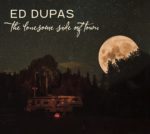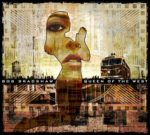 It’s fair to say I’m not a prolific reviewer; it’s all about the process. The first listen to an album decides whether it moves me enough to review it, then it gets another five or six listens before I make some notes, track by track. Then I look at the press release and lyric sheets, sleeve notes and anything else that came with the songs. It’s just the way I do it and it throws up some interesting little insights. And there are some artists that you look forward to reviewing because they always make you think very carefully about their work; Ed Dupas is one of those artists. He writes a lot of songs about relationships, happy or sad, but you know that each album will have one song that digs deep and pulls out a reaction to the world that surrounds us. We’ll get to that in a while.
It’s fair to say I’m not a prolific reviewer; it’s all about the process. The first listen to an album decides whether it moves me enough to review it, then it gets another five or six listens before I make some notes, track by track. Then I look at the press release and lyric sheets, sleeve notes and anything else that came with the songs. It’s just the way I do it and it throws up some interesting little insights. And there are some artists that you look forward to reviewing because they always make you think very carefully about their work; Ed Dupas is one of those artists. He writes a lot of songs about relationships, happy or sad, but you know that each album will have one song that digs deep and pulls out a reaction to the world that surrounds us. We’ll get to that in a while.
Most of the songs on “The Lonesome Side of Town” fall into genres that can be labelled as country, rock or some combination of the two. Country’s the dominant force on this album with arrangements featuring pedal steel, lap steel, banjo and resonator, but the addition of a Hammond B3 adds another dimension, taking the sound into The Band territory. And let’s not forget the Merseybeat feel of “Love Me Right”, with its chiming guitars and sus4 chords.
Of the eleven songs, ten are deeply personal, dealing with aspects of a relationship breakdown and one, “State of the Nation”, placed in the dead centre of the album, is the zeitgeist song. Ed Dupas doesn’t do a lot of these, but when he does, they hit, and they hit hard. “State of the Nation” is an out-and-out rocker about the divide between the people who work and the people who benefit from that work. It’s no frills rock ’n’ roll fired out in less than three minutes and it brings to mind Bob Seger’s 1978 song “Feels Like a Number” – well, Ed does live in Ann Arbor, Michigan. As an example of the level of detail in the production, rather than crashing the over-driven guitar in at the beginning of the second verse, it’s faded in just before the beginning of the verse so that it reaches the right level just as the verse begins; just a little touch, but it works perfectly.
But that’s not to belittle the rest of the album. The title song sets the mood for the album as it tells the familiar story of a relationship with a performer, while “It All Sounds like Leaving” could only ever be a country song, particularly with the line ‘Let’s get on with the grieving, cos it all sounds like leaving’. Ed admits to agonising over the track order and losing one song that didn’t fit, and that confirms the message that it more than just a bunch of songs – it’s an album and there are subtle links between the songs. There are three references to ‘within’ or ‘between the lines’ and “On my Way” refers back to “It All Sounds like Leaving”. The more you dig, the more you find.
“The Lonesome Side of Town” is a beautifully-crafted set of songs coming out of a difficult situation. There are songs of heartache, a song of anger and some songs of redemption and moving forward. They are all songs of passion.
“The Lonesome Side of Town” is released in the UK on Friday October 25th on Road Trip Songs.
 First of all, let me say that this is only available in 375ml bottles rather than the standard 750ml, but it comes in two packages: plastic with a screwtop and glass with a genuine cork. But we’re more interested in quality than quantity aren’t we, so let’s have the tasting notes. Well, I’m getting leather jackets with studs and MOFO patches on the back, shoulder length hair, well-worn Levis and cowboy boots. The ambience of The Midland Hotel Bar in Mansfield in 1973 and Metal Mickey’s rock sessions downstairs in Nottingham Palais in the mid-eighties. It’s a robust flavour with the nuances of Deep Purple, Thin Lizzy and Wishbone Ash (with just a lingering aftertaste of Black Sabbath) and none of the thud and blunder of some of the less subtle bands of the era. It’s Austin Gold’s second album (or mini album) and it’s only available on vinyl or as a download.
First of all, let me say that this is only available in 375ml bottles rather than the standard 750ml, but it comes in two packages: plastic with a screwtop and glass with a genuine cork. But we’re more interested in quality than quantity aren’t we, so let’s have the tasting notes. Well, I’m getting leather jackets with studs and MOFO patches on the back, shoulder length hair, well-worn Levis and cowboy boots. The ambience of The Midland Hotel Bar in Mansfield in 1973 and Metal Mickey’s rock sessions downstairs in Nottingham Palais in the mid-eighties. It’s a robust flavour with the nuances of Deep Purple, Thin Lizzy and Wishbone Ash (with just a lingering aftertaste of Black Sabbath) and none of the thud and blunder of some of the less subtle bands of the era. It’s Austin Gold’s second album (or mini album) and it’s only available on vinyl or as a download.
There’s no denying that Austin Gold are influenced by seventies rock and that can be a blessing or a curse. For every band with twin guitars in harmony, memorable melodies, concise delivery and keyboards enhancing the guitar attack there were equal numbers of lumbering four-to-the-floor units, pretentious lyrics purveyors, over-long solo show-offs and big light shows that masked the defects of the materials.
You know where this is going; Austin Gold personify all of the elements of seventies British rock that I ever bought into while avoiding all of the elements that totally turned me off. The songs are melodic, they all come in about four minutes, there are no ten-minute solos (in fact no guitar pyrotechnics at all) and the drumming doesn’t rely completely on bass and floor tom. Absolutely nothing’s overdone; the songs run their course, maybe with a solo or two and they end. The Hammond and keys contribute to the overall sound rather than standing front and centre and the guitar riffs are simple, loud and effective. And they know how to write an anthem or two.
It’s definitely Côtes du Rhone rather than Beaujolais Nouveau.
“Austin Gold” is out now on Jigsaw (SAW 8).
 It happens every couple of years; we get a new Bob Bradshaw album, and they’re always worth waiting for. Bob’s a very credible singer with a voice that can bristle with taut emotion or smoothe off the edges to demonstrate a rich baritone for the ballads that has a hint of later-period Elvis Costello. The varied arrangements seem almost effortless and always work to emphasise the qualities of the songs, which are also a rich and varied selection of musical and lyrical styles. As you make your way through “Queen of the West”, the pieces of the puzzle begin to fall into place. It’s not a linear narrative, the album opens somewhere in the middle of the story before bouncing back and forth through various critical episodes in the life of Ruby Black, Queen of the West before the album ends with a trilogy of relationship songs which may or may not feature Ruby, closing with tragic story of a boatload of refugees burnt out within sight of the shore – close enough to hear the sounds of the children singing.
It happens every couple of years; we get a new Bob Bradshaw album, and they’re always worth waiting for. Bob’s a very credible singer with a voice that can bristle with taut emotion or smoothe off the edges to demonstrate a rich baritone for the ballads that has a hint of later-period Elvis Costello. The varied arrangements seem almost effortless and always work to emphasise the qualities of the songs, which are also a rich and varied selection of musical and lyrical styles. As you make your way through “Queen of the West”, the pieces of the puzzle begin to fall into place. It’s not a linear narrative, the album opens somewhere in the middle of the story before bouncing back and forth through various critical episodes in the life of Ruby Black, Queen of the West before the album ends with a trilogy of relationship songs which may or may not feature Ruby, closing with tragic story of a boatload of refugees burnt out within sight of the shore – close enough to hear the sounds of the children singing.
And what about those varied styles? Well, the album opens with the beautifully atmospheric and, appropriately widescreen, title song building the atmosphere with floor toms, shimmering guitar and strings as the narrative opens with a tentative reunion for Ruby. It’s a seductive start that sets the scene perfectly for the rest of an album that impresses with its quality and innovation. As an example, three songs in, “Ruby Black”, with its atonal, angular guitar riff pulls together Ruby’s prayer to the saints for her sick child with reminiscences of her musical career, ending with a choral reply from the saints. Which then leads into the almost vaudeville style of “1-800-SOSAINT” pitching the saints as options on a prayer helpline – it’s clever, original and masterfully delivered. Other favourites? Pretty much anything really, but the incredibly catchy “High Horse” and the laconic “Story Goes” have been heavily praised here at Riot Towers.
There’s a lot of chatter about the demise of the album these days and “Queen of the West” is a great example of a piece of work that’s well-written and structured in a way that keeps you engaged throughout. The character of Ruby is developed in a way that pulls you in to her story, crying at the heartache and smiling at the diamond-hard public persona. “Queen of the West” is designed to be listened to as a single piece – it’s a rewarding experience.
“Queen of the West” is out now on Fluke Records (FR10).


